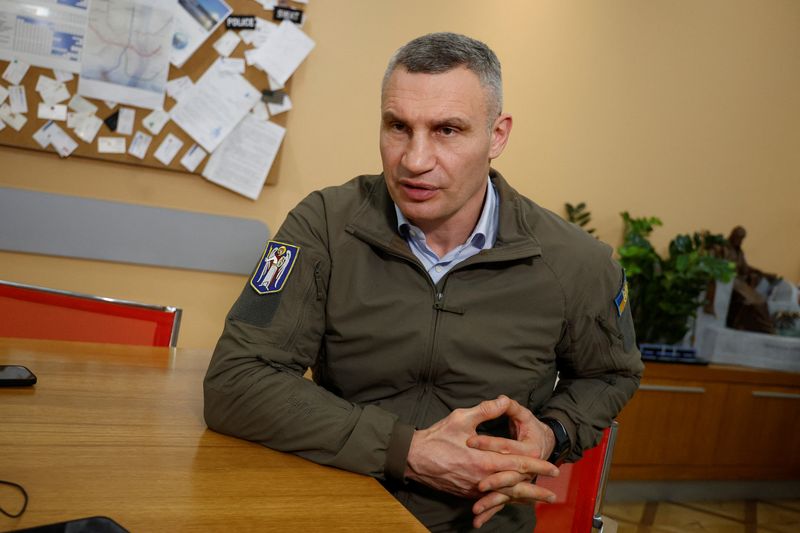By John Irish
DAVOS, Switzerland (Reuters) - Kyiv's infrastructure could collapse at any second as Russia's sporadic missile attacks along with freezing winter temperatures put local authorities under increasing strain, the Ukrainian capital's mayor said on Monday.
Kyiv's mayor Vitali Klitschko and his brother Wladimir told Reuters that Ukraine's Western allies had to speed up deliveries of air defence systems capable of downing Russian missiles.
Kyiv has accused Moscow of indiscriminately targeting civilians as well as key infrastructure, threatening the winter supply of electricity, running water and central heating.
"We don't talk about the collapse, but it can happen ... at any second (because) Russian rockets can destroy our critical infrastructure in Kyiv," Vitali said, adding that there was currently a 30% deficit in energy in the capital.
"It's pretty cold in Ukraine right now so living without electricity and heating is almost impossible. The situation is critical. We are fighting to survive," he said on the sidelines of the World Economic Forum (WEF) annual meeting in Davos.
Former world heavyweight boxing champions Vitali and Wladimir are part of a broader high-level business and political Ukrainian delegation attending the WEF summit.
"It is important not to hesitate to give us weapons that we so need, but to deliver them the sooner the better otherwise we will continue to lose our infrastructure and most importantly our best men," Wladimir said, adding that they expected an escalation in the north of Ukraine from Belarus.
Part of the focus of Ukraine's delegation in Davos will be to lay the foundations for future reconstruction and assess the appetite for investment in the country's recovery.
"Today, we are talking about the war and ending this senseless war, but we need to think about the day after tomorrow," Vitali added.
Beata Javorcik, chief economist for the European Bank for Reconstruction and Development (EBRD), said a top international priority was to help Ukraine get through the winter with as much of its economy intact as possible.
"The challenge is that even if military activity is limited geographically, destruction of infrastructure makes it difficult for businesses to function," she told Reuters.
The EBRD, which last year invested some 1.7 billion euros ($1.8 billion) in energy, transport and other vital infrastructure in the country, estimated Ukraine's local economy shrunk by nearly a third last year.

Javorcik said the continuation of the war, with little immediate prospect of peace, meant the development bank would likely revise down its initial forecast of 8% growth for 2023.
($1 = 0.9248 euros)